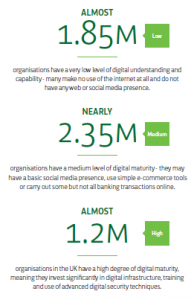How digitally engaged are SMEs and charities?
The second Lloyds Bank Business Digital Index was launched last week in association with management consultancy Accenture. Its headline finding was that for SMEs and charities, there is a “slow and not universal move to becoming more digital???. The report found that attitudes and awareness are the biggest barriers to greater digital adoption, confirming the findings of the BSG micro-business survey conducted last year.
The 2015 Index is based on a survey of 2000 Llyods Bank and Bank of Scotland customers and Llyods Banking Group customer data. SMEs and charities were placed on a scale reflecting their digital maturity – low (disconnected, basic adopters), medium (passive users, starters, established users) and high (advanced users and innovators).
Compared with last year, there are fewer SMEs and charities within the “high??? maturity segment of the scale, and more within the medium segment.
The key findings of the report are the following:
- The digital divide is reducing, with the North West and North East regions closing the gap with the most digital mature regions of London and the South East. The report praises the impact of the work of GO ON UK, a cross-sector digital skills charity sponsored by Age UK, Argos, BBC, Big Lottery Fund, E.ON, EE, Lloyds Banking Group, Post Office and TalkTalk in providing organisations with the support they need to gain digital maturity, especially in the North of the country.
- There is now an established link between digital maturity and organisational success – the most digitally mature SMEs are a third more likely to report an increase in turnover in the past two years than low digitally mature SMEs.
- 77% of SMEs now have basic digital skills (2% increase compared with last year) – 23% are still left behind for a variety of reasons: lack of awareness about the benefits of digital technologies, lack of support in getting the skills needed (this is particularly the case outside of London), lack of time to gain the necessary digital skills, etc. Interestingly, broadband connectivity issues are not highlighted as an obstacle to SMEs becoming more digitally engaged.
- 58% of charities are still lacking basic digital skills. The report calls for this to be a particular area of focus given the link between funding digital maturity.
Unlocking the full economical potential of SMEs is a key issue for the next Government. In a BSG report published last year “Capitalising on Connectivity: realising the benefits of broadband for UK SMEs??? we called the Government to take action to increase its understanding of SMEs’ use of technology and incentivise further take-up.
The full Lloyds Bank Digital Index report 2015 can be found here: http://resources.lloydsbank.com/insight/uk-business-digital-index/






